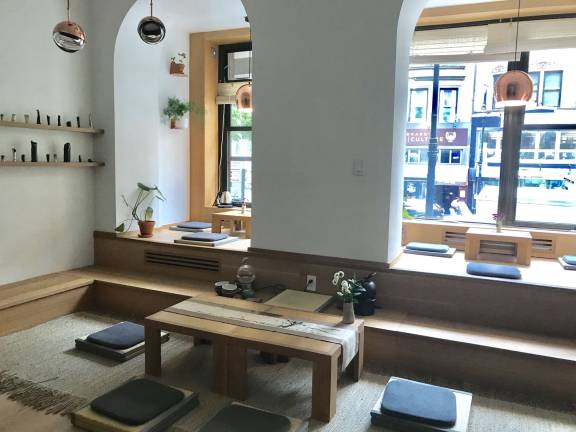A New Tea House Comes to the UWS



Each morning, Elina Medvedeva starts her day by sitting in silence and drinking tea at Floating Mountain, the recently-opened tea house she co-owns with business partner Roza Gazarian on West 72nd Street between Broadway and West End Avenue. She believes that a silent tea bowl ceremony is the proper way to start the day, and so, from 11 a.m. to noon, she sits cross-legged on a cushion on the floor, drinking cup after cup while meditating.
For 42-year-old Medvedeva, a former finance executive, tea — and all the culture associated with it — is more than just a drink; it’s a way of life. It’s with this thought in mind that she and Gazarian, 30, run the business they officially opened on June 12. Nestled above an organic dry-cleaning store, Flouting Mountain is an oasis from the bustling street below, and Medvedeva and Gazarian hope to offer Upper West Siders something they rarely get in New York: tranquility and calmness.
“The way we offer tea here brings you to meditation,” Medvedeva said. “It brings you to a state of mind where you can stop and appreciate the tea. It’s a rare opportunity to stop and really enjoy something.”
It’s for this reason that Floating Mountain doesn’t sell to-go cups of tea. Instead, customers looking for something quick can buy either by the bowl (small cups without handles use in traditional tea ceremonies), by the pot or by the pitcher (for those who like it iced). Floating Mountain offers a variety 50 different kinds of tea to choose from, all from China. The menu is split into three types of teas: greens, yellows and whites, all varying in price.
For those more curious about tea culture, there are a few different tea tasting kits. For $35, customers can choose between five preset kits, which include three different teas. Some kits are entirely green teas, others are all oolong, and some have a mix of tea types. For $45, the customer can create his or her own kit of three teas.
Floating Mountain also offers different sessions, like the Gongfu Session, which focuses on the preparation of the tea, and the Tea Bowl Session, designed to connect the drinkers with nature, themselves and others. For these tea sessions, reservations are required — the Gongfu Session is $40 a person, while the Tea Bowl Session is $15.
When customers cross the threshold, they are greeted with stillness, an open space and a sign requesting they remove their shoes, which can be disorienting for a New Yorker, to say the least.
“Most of the time, people don’t know what to expect,” Medvedeva said. “When they’re brave enough to take off their shoes and sit down, they are quite lost.”
“There’s definitely no intention to spend two hours here, but when you start to drink tea, it just takes you,” she added. “You start to understand that all these super important things you were rushing to are maybe not that important.”
This is also the idea behind the daily silent tea bowl ceremony — to slow down and appreciate the present rather than stress about the past or worry about the future. Anyone can stop in for the free, hour-long meditation; a number of Medvedeva’s late-morning customers come from Ashtanga Yoga Upper West Side, the studio right across the hall, where she herself practices yoga in the morning. The spiritual aspect of drinking tea is what finally pushed Medvedeva to open her own place — she said it was the most logical continuation of her yoga practice.
Medvedeva was leaving yoga one Monday morning in November 2016 when she noticed the space across the hall was available for rent. What was once a custom tailor’s workshop was now just an empty room flooded with natural light. By the time she reached her office on 42nd Street, she had decided to leave the world of corporate finance to start her own business.
That same week, Medvedeva, who said she had always thought of one day opening a tea house, signed the lease for the space.
For the next few months, she and Gazarian prepared to open Floating Mountain, creating a space to mirror the tea ceremony’s soothing quality. Big windows allow natural light to flood the space. Shelves displaying handmade ceramic vases of different heights and shapes, all made by New York artist Anna Aristova, hang on the wall, while the remaining walls are bare and stark white. These minimal decorations, paired with low tables, make the small space feel large and open.
The pair traveled to China in late March to buy their supply of tea leaves. They met with the tea farmers and sampled a variety of different teas to create their menu. This was important to Medvedeva, who didn’t want to buy tea in bulk on the Internet — she said that’s not what Floating Mountain was about.
“It’s about bringing an appreciation and deep respect to the tea, to the farmer, to the culture, to the process,” she explained. “All of these are things that are quite easy to forget.”
While primarily a tea house, Floating Mountain is also a gallery of sorts. The two business partners decided to use part of their space to showcase both international and local artists who specialize in ceramic art.
“We thought that the ceramic art — the ceramic bowl and ceramic teapot — is a big part of the tea ceremony and the tea experience,” Gazarian said. “So it would be nice for half the space to highlight the contemporary artists who work in that medium.”
Their current exhibition features Aristova’s work; Gazarian also has two shows planned for September and November that will showcase two international artists who are collaborating on a collection of Japanese tea bowls.
“We created the space with art in mind,” Gazarian added. “It’s nice to not only make [Floating Mountain] about the drink but about the culture as well.”